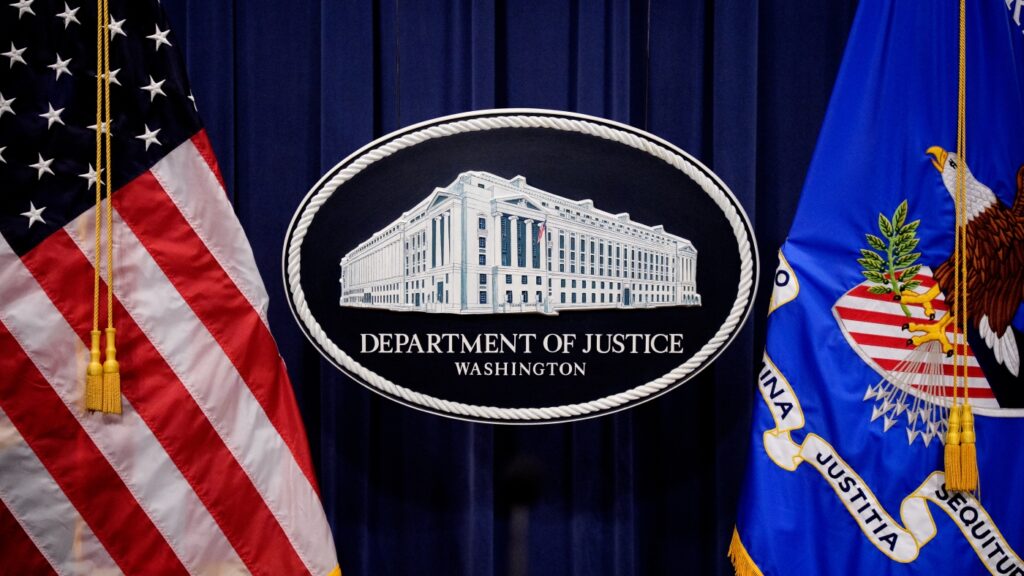
WASHINGTON, DC - MAY 6: The Department of Justice logo is displayed before U.S. Attorney General Pam Bondi arrives for a news conference at the Department of Justice on May 6, 2025 in Washington, DC. The Justice Department along with the Drug Enforcement Administration (DEA) and the U.S. Attorney's Office for the District of New Mexico are set to announce that they have completed an operation targeting a large drug trafficking organization that has been dealing fentanyl and other illicit narcotics. (Photo by Andrew Harnik/Getty Images)
The U.S. Department of Justice (DOJ) has announced a new directive to prioritize the denaturalization of certain naturalized citizens, intensifying efforts to revoke citizenship from individuals who have committed specific crimes. This initiative, revealed in a memo dated June 11, grants district attorneys increased discretion in pursuing these cases, particularly targeting naturalized citizens who were not born in the United States. According to 2023 data, approximately 25 million immigrants have become naturalized citizens in the U.S.
In a recent case, a judge ordered the denaturalization of Elliott Duke, a military veteran originally from the U.K., convicted of distributing child sexual abuse material. Duke, who uses they/them pronouns, admitted to committing these crimes before becoming a U.S. citizen. This case marks a significant application of the DOJ’s renewed focus on denaturalization.
Historical Context and Legal Framework
Denaturalization has been a contentious tool in U.S. history, notably utilized during the McCarthy era of the late 1940s and early 1950s to strip citizenship from those suspected of lying about criminal convictions or affiliations with illegal groups. The practice was expanded during the Obama administration and further developed during President Trump’s first term. Assistant Attorney General Brett A. Shumate emphasized the importance of denaturalization in the DOJ’s enforcement priorities, stating,
“The Civil Division shall prioritize and maximally pursue denaturalization proceedings in all cases permitted by law and supported by the evidence.”
This move is part of broader efforts by the Trump administration to reshape the U.S. immigration system, including attempts to end birthright citizenship and reduce refugee programs. However, legal experts have raised concerns about the constitutionality of these efforts and their impact on families of naturalized citizens.
Legal and Ethical Concerns
The DOJ plans to pursue denaturalization cases through civil litigation, a strategy that has drawn criticism from legal scholars. Cassandra Robertson, a law professor at Case Western Reserve University, argues that this approach violates due process and infringes on rights guaranteed by the 14th Amendment.
“In civil proceedings, any individual subject to denaturalization is not entitled to an attorney, and there is a lower burden of proof for the government to meet,” Robertson explained.
Conversely, Hans von Spakovsky of the conservative Heritage Foundation supports the DOJ’s efforts, stating,
“I do not understand how anyone could possibly be opposed to the Justice Department taking such action to protect the nation from obvious predators, criminals, and terrorists.”
He argues that individuals are not entitled to government-funded legal representation in civil matters, including denaturalization cases.
Expanding Criteria and Implications
The DOJ memo outlines expanded criteria for denaturalization, including national security violations and fraud against government programs. Sameera Hafiz, policy director of the Immigration Legal Resource Center, expressed alarm at the administration’s plans, stating,
“It is kind of, in a way, trying to create a second class of U.S. citizens.”
Experts like Steve Lubet from Northwestern University warn that the broad discretion granted to U.S. attorneys could lead to arbitrary targeting of individuals.
“Many of the categories are so vague as to be meaningless,” Lubet noted.
He also highlighted the potential impact on families, particularly children whose citizenship could be jeopardized if a parent’s naturalization is revoked.
Historical Parallels and Future Outlook
Denaturalization has a complex history in the U.S., with its peak during the McCarthy era when approximately 22,000 cases were filed annually. A 1967 Supreme Court ruling curtailed the practice, deeming it inconsistent with democratic principles. However, the Obama administration revived denaturalization efforts through initiatives like Operation Janus, targeting potential immigration fraud.
Laura Bingham, executive director of the Temple University Institute for Law Innovation and Technology, cautions against the precedent set by the Duke case.
“Citizenship is not supposed to be something that you can continuously open up for some people, and you can’t for others,”
she stated.
As the DOJ moves forward with its denaturalization agenda, questions remain about its scope and impact. Legal experts like Robertson remain skeptical about the number of cases that truly meet the administration’s criteria, suggesting that the focus may shift to individuals with minor infractions or none at all.
The DOJ and the Trump White House have declined to comment on these developments. Meanwhile, individuals affected by the denaturalization efforts are encouraged to share their experiences through secure communication channels.







